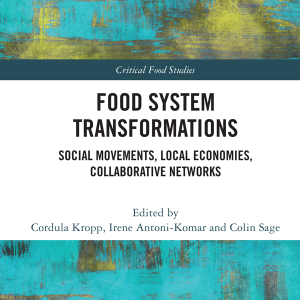
This book, co-authored by Table member Colin Sage, uses case studies to investigate how local food movements, enterprises and networks can contribute to the transition towards a sustainable food system. Chapter 1 is available for free download, and Chapters 3, 7 and 8 will also become available for download shortly.
Publisher’s summary
This book examines the role of local food movements, enterprises and networks in the transformation of the currently unsustainable global food system. It explores a series of innovations designed to re-integrate sustainable modes of food production and encourage food sovereignty.
It provides detailed insights into a specialised network of social actors collaborating in novel ways and creating new economic arrangements across different geographical locales. In working to devise ‘local solutions to global problems’, the initiatives explored in the book represent a ‘second-generation’ food social movement which is less preoccupied with distinctive local qualities than with building socially just food systems aimed at delivering healthy nutrition worldwide. Drawing on fieldwork undertaken in sites across Europe, the USA and Brazil, the book provides a rich collection of case studies that offer a fresh perspective on the role of grassroots action in the transition to more sustainable food production systems.
Addressing a substantive gap in the literature that falls between global analyses of the contemporary food system and highly localised case studies, the book will appeal to those teaching food studies and those conducting research on civic food initiatives or on environmental social movements more generally.
Reference
Kropp, C., Antoni-Komar, I. and Sage, C. (eds.), 2020. Food System Transformations: Social Movements, Local Economies, Collaborative Networks. Routledge, London.
Read more here. See also the Table explainer How can we reduce food-related greenhouse gas emissions?







Post a new comment »